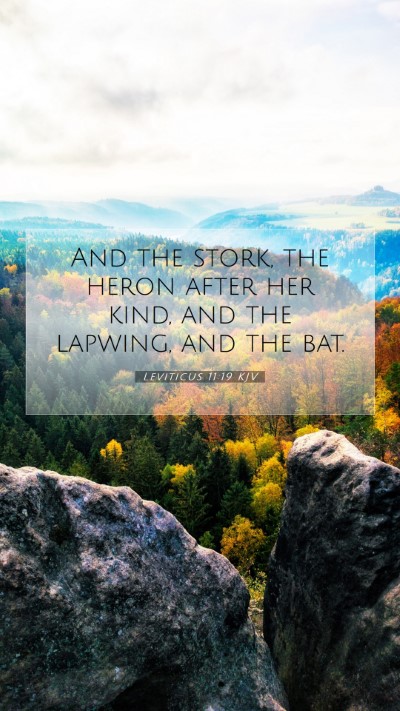Understanding Leviticus 11:19
Leviticus 11:19 states, "And the stork, the heron after her kind, and the lapwing, and the bat." This verse forms part of the dietary laws prescribed to the Israelites, detailing which animals they could eat and which they could not. Below is a comprehensive analysis of this verse gathered from several public domain commentaries.
Overview of the Verse
This verse lists certain birds that are considered unclean according to the Mosaic Law. Understanding the significance of these dietary restrictions requires an exploration of the broader context of Leviticus, particularly the themes of holiness and separation.
Bible Verse Meanings and Interpretations
- Matthew Henry's Commentary:
Matthew Henry describes the birds listed in Leviticus 11:19 as examples of unclean animals, emphasizing that even the birds deemed unclean were to serve as a reminder of God's holiness. The distinction God draws between clean and unclean reflects His desire for His people to be set apart. Henry notes the rituals and rules as an illustration of God's command to live a life of holiness.
- Albert Barnes' Notes:
Albert Barnes elaborates on the classification systems within the law and their purpose. He explains that these laws served not only dietary purposes but also spiritual lessons about obedience and God's desire for purity among His people. Barnes highlights that these classifications reinforced the need for separation from the practices of surrounding nations.
- Adam Clarke's Commentary:
Adam Clarke emphasizes the cultural and historical context of these avian classifications. He notes that certain birds are viewed negatively due to their scavenging behavior, which could symbolize moral decay. Clarke proposes that these dietary laws were also practical, aimed at protecting the Israelites from diseases associated with consuming certain animals.
Significance of the Birds Listed
The specific birds listed in Leviticus 11:19—stork, heron, lapwing, and bat—carry symbolic and practical implications:
- Stork: Often viewed as a symbol of care and nurture, the stork may also represent connections with prosperity and motherhood, but remains unclean according to dietary law.
- Heron: This bird represents a preference for watery habitats, which some believe indicates a lifestyle associated with impurity.
- Lapwing: This bird, alongside others cited in the text, serves to reinforce the idea of a distinct and separate identity for the Israelite people.
- Bat: Although a mammal, the classification of the bat within this verse highlights the expansive regulations of the Hebrew dietary laws, illustrating key principles of holiness and separation.
Bible Study Insights
For those engaging in Bible study groups or online Bible study, Leviticus 11:19 provides an excellent case for discussion. Here are some insightful points to consider:
- How do the dietary restrictions in Leviticus symbolize spiritual truths today?
- In what ways do modern believers interpret these Old Testament laws?
- What can we learn from the practice of holiness as demonstrated through dietary laws?
Cross References
This verse has notable connections with other Scriptures that enhance understanding:
- Deuteronomy 14:11-20: Further instruction on clean and unclean animals.
- Isaiah 66:17: A prophetic warning against consuming unclean things.
- Acts 10:12-15: Peter's vision and the New Covenant interpretation of dietary laws.
Conclusion
In conclusion, Leviticus 11:19 serves as both a dietary guideline and a powerful reminder of God's call to holiness and separation. As believers delve into this passage, they are encouraged to explore its meanings and applications through rigorous biblical exegesis and scripture analysis. Understanding such scripture can strengthen one's faith and enhance devotional practices.
Further Study Suggestions
For those looking to expand their understanding of this verse and similar topics, consider exploring resources on:
- Bible study lessons focusing on the Old Testament.
- Bible study guides that discuss the cultural context of law.
- Bible study resources for understanding unclean animals and their theological implications.


